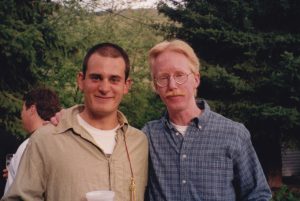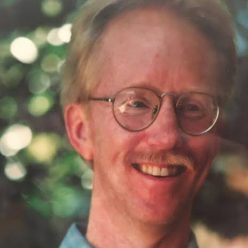 by Burke Stansbury
by Burke Stansbury
I got to know Scott in the year 2000. He stood up after a film showing in Missoula and announced the first meeting of a new group called Community Action for Justice in the Americas – CAJA. I was immediately struck by this straight-laced white guy with a well-trimmed mustache. He was clean-cut, formal, and kind of geeky…not exactly the person you’d imagine to be leading the revolution. But his passion and determination came through and I was impressed. I showed up at the first CAJA meeting and I’ll always remember how Scott did the round of introductions – insisting that we should go around the circle to the LEFT and chucking to himself as he said it. Scott did that at every subsequent meeting I ever saw him facilitate, and he always laughed the same way, as if it were the first time he had ever made the joke.
During that first year of CAJA I put together my first flyer, helped organized my first event, facilitated my first meeting, and acted as the media spokesman for the first time at an action. Scott mentored me at every step of the way, encouraging me to take on bigger leadership roles right on up the ladder. I’ve been an organizer every since, and its fair to say that where I am today has as much to do with Scott as just about any one else in my life.
There are two reasons for that: one is that he was the first person to actually suggest to me that I could and should devote my life to community and political organizing. Until he said that it hadn’t occurred to me that such a thing was possible.
The second is that he told me that if I really wanted to learn revolutionary organizing, strategy and political analysis that I had to go live in El Salvador. He connected me with an organization called CISPES and I subsequently worked for a year in San Salvador and then 8 more years in the US with CISPES, traveling frequently during that time to El Salvador.
El Salvador was also quintessential part of Scott’s revolutionary consciousness. He went there in the late 1980s with the civil war still raging and helped impoverished campesinos who had been forced from their villages by US-funded government bombing to return and re-populate their own destroyed homes. It was the ultimate act of bravery and resistance in the midst of imperialist violence, and Scott was deeply affected by the experience of witnessing that act. He was also impressed by the brilliant organizing tactics that leftist guerrillas and the social movement in El Salvador employed to beat back a regime propped up by the biggest military in the world.
What Scott also learned during his time in El Salvador is that that witnessing – and subsequently telling the stories, as well as facilitating leaders from Latin America in telling their own stories — is an extremely potent strategy in countering violence and injustice. He would employ the strategy repeated over the next three decades of his life to tremendous effect.
In El Salvador, Scott was not only witnessing; he was putting his body on the line and risking his own safety to help and protect those threatened by the military, those facing hardship and suffering because of US policies. It was something he continued to do for decades, most prominently in Colombia during the civil war there, and most recently on the US-Mexico border. It’s fair to say that constantly being around places and people experiencing violence, suffering, destruction and death took its toll on Scott. It had serious, long-lasting psychological effects. The trauma this produced stayed with Scott and contributed to his depression, and ultimately, to his death. It is important for us here today to acknowledge that.
There’s one final story I want to tell, involving one of the best memories I have of working with Scott in our CAJA organizing prime. A historic leader of the Salvadoran teachers union named Rafael Coto came to Missoula as part of a tour organized by CISPES. It happened right around the time that a campaign to prevent professor and adjunct firings at UM was fizzling. Scott knew Coto from his years living and working in El Salvador, and they had a trust and camaraderie that was infectious. After a big public event, a group of CAJistas took Coto out to the Union Club and soon Scott was getting him fired up about the injustice of the pending teacher layoffs. As an educator himself, Coto felt solidarity with the UM professors, and fueled by Scott’s prodding (and a few beers) he started scheming a new campaign to stop the firings.
We shut the bar down that night, sketching out our plan on the back of a napkin as Coto told stories of teacher strikes in El Salvador during the war. The next day Scott called me up and we went to work, eventually building a coalition, organizing a high-profile protest outside the football stadium, and ultimately helping to stop the worst of the cuts. Of course, Scott always talked how it was a union leader from El Salvador who reignited that campaign, and for him it demonstrated solidarity at its best – a two-way street in which activists in the US could take lessons from our comrades in the South and turn them into organizing victories.
Scott embodied such solidarity. I will always remember what he taught me, his determined spirit, and his extraordinarily deep commitment to fighting for justice in the world.
